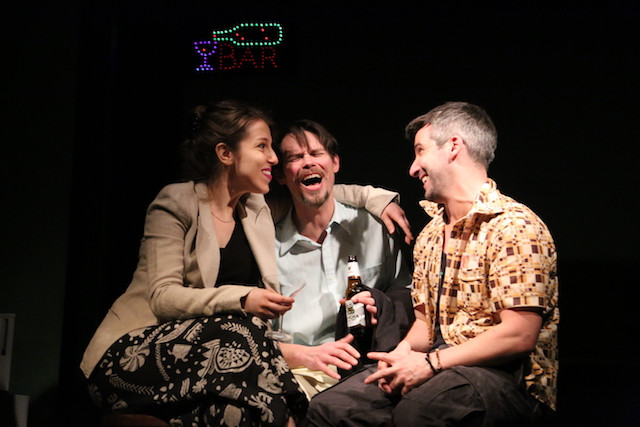Most of us have had someone like that in our lives, who makes us feel vulnerable and inadequate. For 40-year-old doctor Neal (played by Nickel Bösenberg) in Joe Penhall’s “Love and Understanding”, which opened at the Théâtre des Capucins in Luxembourg City on 28 February, the Achilles heel is a childhood friend.
Richie (played by Owen Sharpe) is an impulsive liar and thrill-seeker who, after years of travelling the world, turns up on the doorstep of the poky flat Neal shares with girlfriend Rachel (Larisa Faber) to test the fragile walls of their careers and relationship.
The result is a rollicking volley back and forth between the friends whose personalities embody the questions that defined both the ‘90s, in which the play was written and set, and now.
Questions arise such as can we sustain the sacrifices required to “make a difference” as an overworked doctor in a struggling NHS or the world as a whole? Why not just let other people save lives and “try something less serious”?, as Richie suggests through his verbal diarrhea of advice and irresponsible behaviour.
Sharpe’s jack-in-the-box Richie is spot-on as the in-your-face conman whose observations on life are as funny and irreverent as a stand-up comic’s.
If his accent was a little confusing at the start, his boundless energy, which drives the plot and holds the audience mesmerised, more than makes up for it.
One empathises with Faber’s Rachel, who softens from a stern rock into someone more flawed and real under Richie’s influence.
Meanwhile, it is hard not to feel for Bösenberg’s trapped, anxious doctor, who is frequently pushed to the limits of sanity.
Filmic staging
There was something of a filmic quality to director Anne Simon’s staging of the play--notably in the way characters conversed with one actor, usually Richie, addressing the audience, and either Rachel or Neal talking to the back of the stage.
This gave the impression of different camera angles, hinting at the kind of intimacy one might find in a movie, an effect that was further accentuated by plinky, acoustic music played at various intervals.
This effect created a comforting cocoon for the audience, which was frequently blown open by the juxtaposition of disjointed conversations set to harsh, jarring music at the beginning and end and the frequent crossing of the fourth wall.
Whether it was Rachel saying “I am” to Richie then, “I am not” to the audience as if we were a disapproving mother, or her sitting in the audience to watch the Richie show unfold, spectators felt part of this relationship trial, as both judges of the characters and ourselves.
Another clever device was Marie-Luce Theis’ stage design of a utilitarian, green interior which doubled as both the hospital and home. As the play unfolded, walls were removed, as if stripping back another layer of the characters.
Themes growing in relevance
The overall impact was effective in provoking a reflection on how as real people (as opposed to characters in a film or play) we juggle making a difference to the world while having meaningful relationships and resisting the judgment of those around us.
This staging suggests that these challenges are still relevant today and even more so. Seeking escape from the burdens of our lives through unreal, 2D relationships as depicted in movies and box sets, to which the play gives nods in its filmic quality, we are still looking for answers to these questions.
It was interesting that Simon kept the play within the context of the 1990s. Had she decided to place it in a contemporary setting, I would have been curious to see how social media would further muddy the waters.
All in all, "Love and Understanding" is a thought-provoking and entertaining reflection on life, which should help us peel back a few layers in our own worlds.
Where and when to see it
"Love and Understanding" will be performed in English on the 2, 3, and 4 March at the Théâtre des Capucins at 8pm. An introduction by Janine Goedert is given before the play at 7:30pm.
